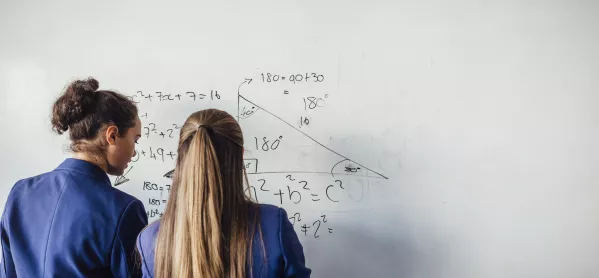When Michael Gove reformed maths GCSE, the aim was to make it more rigorous, increase the amount of content and better prepare pupils for A levels.
But when introducing what became known as the “big fat maths GCSE”, did policymakers lose sight of the needs of lower-attaining pupils?
This is a question about the large group of young people labelled “the forgotten third”: those pupils who did not achieve at least a grade 4 “standard pass” in both English and maths.
GCSE results: Schools battle to help 'forgotten third'
News: GCSE maths not fit for purpose, say 81% of teachers
Exclusive: New GCSEs less accurate, teachers warn
Heads: GCSEs 'rub pupils' noses in disappointment'
Candidates sat the first of the reformed maths papers in 2017, and schools immediately reported that the difficulty of the exams had knocked the confidence of even able pupils.
For those pupils for whom maths does not come easy, Lucy Heller, CEO of the Ark academy trust, says that a harder maths GCSE serves to “put off and frighten” them.
Should we change GCSE maths?
So important does the Department for Education think it is to get good GCSEs in English and maths, pupils who do not get them the first time around can then be trapped in a seemingly endless succession of resits throughout their post-16 education, leaving most to simply experience failure again and again and again.
And for those young people, what will all that effort count for? Employers will see a maths qualification that is at best a grade 3. As Sir John Rowling, chief executive of the PiXL partnership of nearly 3,000 schools, says: “You can’t really celebrate a grade 3." It does not give employers an assurance that candidates can do the practical maths needed in the real world.
The government suggests this is not a problem, noting that GCSE maths already has two tiers “to support pupils of all abilities, whether they are working towards grades 5-1 or the higher grades 9-4”. And those who get a grade 2 or below can study maths functional skills post-16, rather than having to retake their GCSE.
The problem, though, is whether employers have as much confidence in functional skills as they would have in a GCSE at grade 4.
What if there is a better solution, which would give pupils who can do real-world mathematics a full GCSE that recognises this?
That is the suggestion of those, such as Ms Heller, who want to see the current GCSE maths split into two separate GCSE qualifications: one to certify an ability in functional maths, and another to recognise achievement in the more academic side of the subject.
This is not, she stresses, a proposal to dumb down maths, or ensure there are prizes for everyone: if a pupil could not do functional maths, they would not get this qualification, and she imagines the great majority of pupils would do both GCSEs.
Many teachers clearly think there is an issue that needs to be addressed, and the idea of splitting the GCSE found a lot of support when it was suggested on a community forum on the Tes website, despite some hesitations about another shake-up of the exam system so soon after the Gove reforms.
But apart from practical questions of how exam boards would split the GSCE, and how schools would adapt to teaching the two subjects, there is another concern that some teachers raised. It is less to do with maths than English, and it is one that has echoes in a previous attempt to split the maths GCSE.
In 2014, the DfE published an independent evaluation of a pilot that had involved hundreds of schools using a form of double maths known as a linked pair of GCSE maths (MLP). One of the qualifications focused on applying maths to everyday situations, and the report raised concerns that this “might not be suitable for some lower-attaining students”.
It said: “The low levels of literacy of these students could result in their struggling to understand what is required when faced with scenario-based/contextualised tasks (there is more of a focus on applications of mathematics in the MLP than the single GCSE).”
If the DfE does ever decide to split GCSE maths, it will have to be careful that its reforms do not disadvantage the very pupils they are supposed to help.





